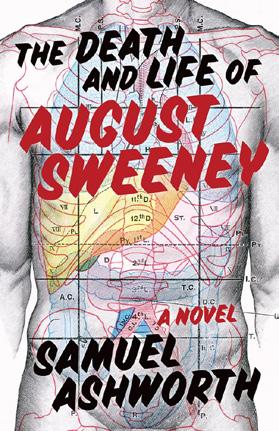MASON UNIVERSITY DEPARTMENT



MASON UNIVERSITY DEPARTMENT


Dear alumni and friends,
This semester I am teaching a research seminar on Early American Women Writers that fulfills the capstone requirement for English majors. We will examine what women in this period wrote, but also how they were published, how their words were authorized and framed by editors, and how they claimed authority by engaging the publishing practices of their times. During introductions on the first day of class, I was delighted that one student emphasized her interest in publishing practice and the ways an examination of 17th- and 18th-century print culture meshed with her minor in Dynamic Publishing.
Have some news of your own?
Want to get this newsletter electronically? Send us an email: engnews@gmu.edu
English Matters is produced by the English Department and distributed to alumni twice a year.
Third-year MFA students Taylor Schaefer and Tori Reynolds are each pursuing the Graduate Certificate in Publishing Practice.
In this issue of English Matters, we feature this minor and our new Publishing Practice graduate certificate. Like our other graduate certificates and many of our minors, these programs help students reach specific professional goals in writing, teaching, and the public humanities. But as my student’s observation about the Dynamic Publishing minor demonstrates, they can also deepen connections across our concentrations. This past fall, the department approved a new class on the history and theory of publishing practice and technology as part of the new minor. I’m excited by the opportunities this class and these programs create for connecting students’ experiences working with Stillhouse Press and Poetry Daily to the exploration of print culture and publishing practices in classes across the department.
Students in my class will rely heavily on databases and images of texts and artifacts to do their research. For faculty, databases and digital images are usually not enough. To support faculty in literature and screen cultures, a donor has started the English Department Literature Faculty Professional Fund, which provides support for the research efforts of tenure-line faculty who specialize in these fields. Associate Professor Samaine Lockwood was the first recipient of a grant from this fund, which augmented a short-term research fellowship from the New York Public Library for work on the Ann Petry Papers at the Schomburg Center for Research in Black Culture last spring. Without this grant she would not have been able to stay in residence near the Schomburg for a full two weeks. The research Samaine did at the Schomburg contributes significantly to her current book project, Tituba: The History of an American Cultural Figure. If you would like to contribute to this fund, you may do so by clicking on Give at the top of our homepage (https://english.gmu.edu), selecting Other, and specifying this fund in the comments box. Or you may contact Eleanor Weis, Senior Director of Development for CHSS (eweis2@gmu.edu) or me (tharvey2@gmu.edu) for more information. I’m looking forward to reporting on the many opportunities and accomplishments this fund will support in the coming years.
I know many of us have been thinking about Professor Winifred Keaney, a faculty member in the English department for over 40 years, who passed away in November. As a new faculty member at Mason, I was so grateful for her warmth and easy collegiality; she asked my opinion before I knew how the copier worked much less what opinions I might be forming, and I think about her every November when my energy starts to flag because she once assured me that it is natural to crash a little before the final push of the semester. We will be planting a memorial tree in her honor on campus in the fall and hope that many of you will join us as we remember Winnie’s life and many contributions to our community.
Tamara Harvey, Chair, Department of English
Jasmine Haskins is the first recipient of the Bill Miller BFA Scholarship in Creative Writing, established to support undergraduate creative writing students who are part of an under-represented group at Mason or who are involved in a community group, activity, or registered student organization that works on issues or causes related to under-represented groups. The scholarship provides $2500 in support.
“Jasmine is so clearly a worthy recipient to inaugurate this scholarship, I am honored by her having been selected,” said Bill Miller, MFA ’87, who directed the creative writing program from 1992 to 2018 and helped found the BFA in creative writing. “She clearly is a talented writer, and I hope that this support and her having been selected will encourage her to develop her talent to its fullest potential. I think we will be seeing her by-line accompanying a lot of written words before long, and I wish her well as she works toward that goal.”
Haskins was raised in Virginia and grew up reading fantasy and supernatural fiction with her father, which led to her writing fiction throughout most of her childhood.
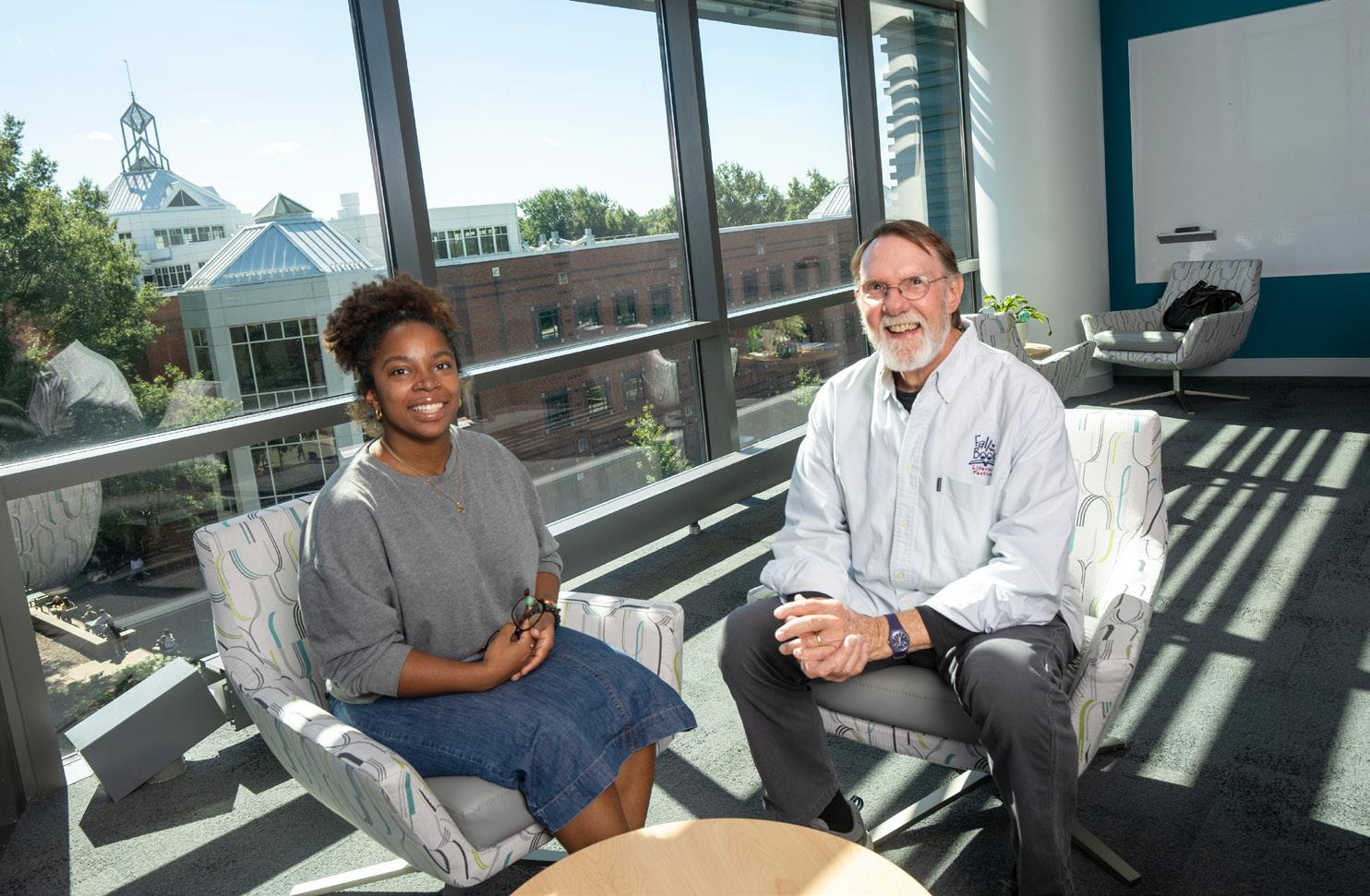
In high school, she discovered poetry through a school project, which she primarily writes today.
According to Haskins, achieving this award will help her further pursue her career as a writer. “I had so many doubts about myself, my writing, and my career choices so after

hearing that I was selected for something because of my writing, I cried. After supporting myself through school for so long, to have this help as I finish my time at Mason feels like a blessing and a push forward to my career as a writer.”
Please consider financially supporting our work and the next generation of George Mason English students. Your gift will have an immediate impact on the future of our department and the writers and scholars we prepare for the world.
To contribute online, visit english.gmu.edu and select “Give” in the top right corner. If you have questions about the levels of giving or named fund opportunities, please contact Eleanor Weis, senior director of development, at eweis2@gmu.edu.
Eric Anderson and his co-editors have recently submitted the manuscript for “The Impossible Shot: Race, Genre, and Spectacle in Jordan Peele’s Nope,” including a chapter by James Steck, a current graduate student enrolled in the Graduate Certificate in Literature and Composition program. Anderson also helped to create the Society for the Study of American Gothic, for which he currently serves as Vice President; visit the website for more information on membership, conferences, and the peer-reviewed journal American Gothic Studies. Additionally, Anderson helped organize a new interest group on Ecohorror and Ecogothic for the Association for the Study of Literature and Environment.
Hyunyoung Cho has concentrated over the past year on engaging public humanities projects centered around literature in Incheon, the second largest city in Korea and home to Incheon Global Campus (IGC), where Mason Korea is located. In October, Cho helped IGC to organize a “World Classics Marathon Reading” event focused on Pride and Prejudice; about 100 people participated, including the Incheon Metropolitan Office of Ministry of Education (IMOE) and students from elementary to high school. Cho was also appointed to the Read-Walk-Write Initiative Steering Committee of the IMOE and, at a December conference hosted by the IMOE, presented on the “Literature-Centered Cultural Exchange Program” at Inner City Incheon
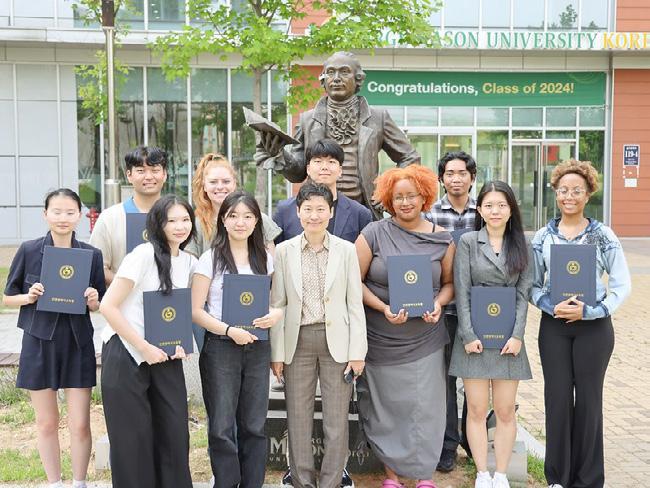
Hyunyoung Cho (center) helped lead a Literature-Centered Cultural Exchange Program with schools in Incheon, where Mason Korea is based.
schools, a project supported by three Mason students. All of these projects are fully funded externally, with stipends for participating students. As a Standing Committee member of the International Milton Symposium, Cho also joined the Milton’s Cottage museum to participate in “Miltonathon,” a 24-hour marathon reading of John Milton’s works in commemoration of the 350th anniversary of his death; she led the Korean team, including three Mason students, for a reading of Book 8 of Paradise Lost. Cho gave a public lecture on John Milton’s Paradise Lost at a community center in inner-city Incheon, Finally, as a special advisor to the IMOE, Cho arranged a visit by an IMOE delegation to the New York City Department of Education and a meeting with seven New York State Assembly members.
Michael Don recently had four short stories published: “Homecoming” in Pithead Chapel, “The Visitor” in Short Story, Long, “Friendly People” in Puerto Del Sol, and “Dads in Shorts” in Passages North. Don also placed a humor piece in Defenestration: “Organic Milk Is Over: Fund the Arts!”

Douglas Eyman joined Hongmei Sun, an associate professor of Chinese at Mason, and Li Guo to co-edit Games and Play in Chinese and Sinophone Cultures, published in July by the University of Washington Press. The book adds to the rising scholarly field of game studies with a focus on the history of games in China, from “Weiqi (a.k.a. Go), one of the world’s oldest board games” to the country’s role as “a major player in the contemporary digital game industry.”
Anna Habib has recently been promoted to one of the lead editors of the WAC Clearinghouse’s International Exchanges on the Study of Writing book series , joining two other members of the department on the masthead: Esther Namubiru, a current PhD student in Writing & Rhetoric, who is an Intern Associate Editor, and Terry Zawacki, professor emerita, a Founding and Consulting Editor. Additionally, Habib and Namubiru are launching a podcast in January 2025 titled Beyond Conventions: Global Dialogues on
The American Folklore Society welcomed Professor Debra Lattanzi Shutika as a Fellow of the society in 2024—an honor conferred to folklorists who have made “outstanding contributions to the field.”
“It’s a great honor to be inducted to the Fellows of the American Folklore Society,” Shutika said. “I look forward to working with the fellows to promote the field of folklore in the U.S. and Ireland.”
As the AFS website explains, “Members of the Fellows have produced a significant number of important articles, books, and other scholarly productions or exhibitions on folklore, and have provided meritorious service to the Society and the discipline of folklore studies.”
Shutika, a former chair of the English Department, is a folklorist whose courses focus on ethnographic field documentation, Appalachian studies, Irish folklore and culture, digital storytelling, and sense of place. She is author of Beyond the Borderlands: Migration and Belonging in the United States and Mexico, which won the 2012 Chicago Folklore Prize.
In 2022-23 she completed a research and teaching Fulbright award in Ireland where she completed a folklore collection in the Gaeltacht (Irish speaking) communities of Achill and Erris exploring women’s traditional agricultural practices.
For more information on the American Folklore Society, visit https://americanfolkloresociety.org/.

Writing; the podcast will bring together writing studies scholars and researchers from around the world to “explore the global landscape of writing, challenge long held Western-centric assumptions in writing studies praxis, and cultivate cross-cultural understanding and collaboration in writing research, publishing, and pedagogy beyond the Global North contexts,” as Habib explains. The podcast will be available on Spotify and Apple Podcasts.
Paul Haspel won the 2024 Paul Green Prize, an annual award that is given out for scholarship relating to the work of North Carolina playwright, for his article “Abandoned Roanoke: A Sixteenth-Century Mystery, Interwar Anxiety, and Historical Speculation in Paul Green’s The Lost Colony” in North Carolina Literary Review 33 (2024).
Sally Keith’s poem “Limus Polyphemus” appeared in Issue 50 of The Androit Journal.
Elizabeth Paul’s Blue Lovers, an e-chapbook of ekphrastic prose poems, was published by Yavanika Press in October.

Catherine E. Saunders has a study leave in Spring 2025 for her project “Building Community Ties by Investigating Slavery.” She will continue researching the role of slavery in the founding decades of Lewinsville Presbyterian Church in McLean, Virginia. She will be building a site on Omeka, an open-source web-publishing platform, to contain primary documents, recruiting transcribers for those documents, and assembling a dataset for submission to the Journal of Slavery and Data Preservation. In the process, she hopes to build connections with individuals and other congregations with intertwined histories.
Lijun Zhang’s new book Living in Heritage: Tulou as Vernacular Architecture, Global Asset, and Tourist Destination in Contemporary China, was published by Indiana University in September. Designated a UNESCO World Heritage Site in 2008, tulou— translated as “rammed earth building”—are multistory communal buildings in southeast China. This new study “introduces readers outside of China to this classic example of local Chinese architecture in the context of contemporary heritage preservation and tourism.”

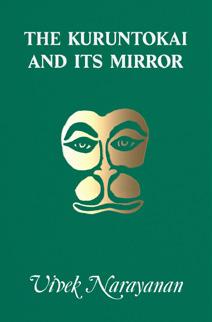
Vivek Narayanan’s fourth book of poems, The Kuruntokai and its Mirror, was published this summer by Hanuman Editions, a new publishing project that seeks “to gather a trans-geographical, trans-disciplinary poetics through commissioned writings in the spirit of avant-garde foundations.”
Art Taylor, MFA ’06, had two short stories published this fall: “Tuesday Night Teas” in Agatha and Derringer Get Cozy: Thirteen Tales of Murder, Mystery, and Master Detection, and “After Their Convictions Six Murderers Reflect on How Killing Mr. Boddy Changed Their Lives,” co-written with Tara Laskowski, MFA ’06, in Black Cat Mystery Magazine
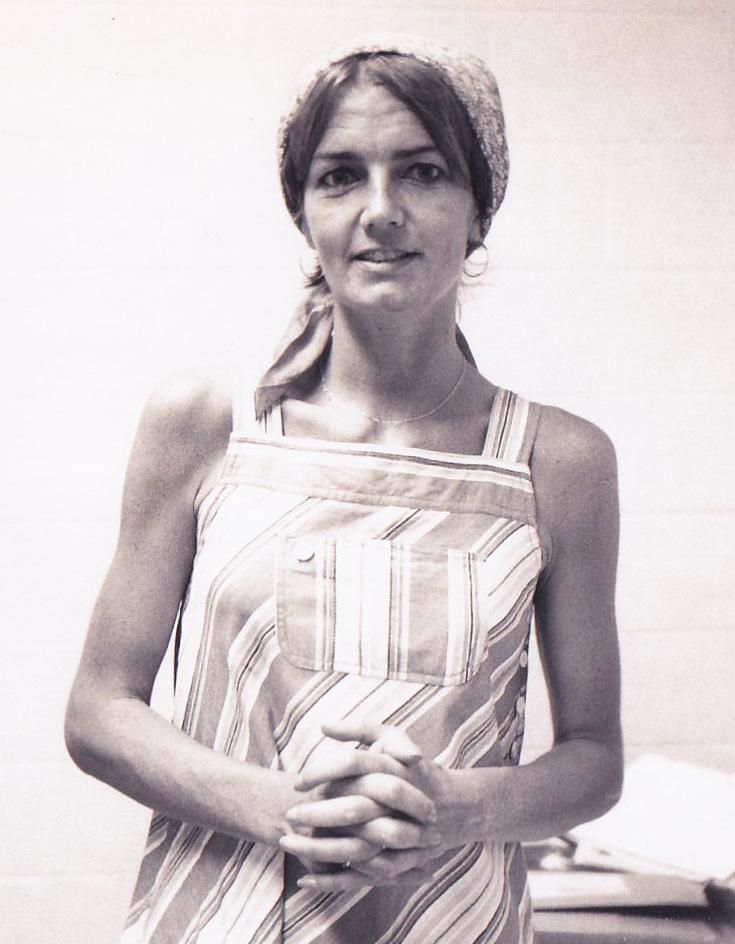
Winifred Keaney
Winifred Keaney, who was a professor of medieval literature at Mason for three decades, died on November 24.
“Winnie was a smart, kind, and supportive colleague and professor,” said Tamara Harvey, chair of the English Department.
“I sought her out often, especially in my early years in the department, and aspire to her warmth and wisdom.”
A graduate of St Bonaventure University, Duquesne University and the University of Maryland, Keaney earned an undergraduate, masters and doctorate in English. She contributed to many literary journals and an edited collection, The Expansion and Transformations of Courtly Literature.
George Mason University’s MFA program in Creative Writing has always been different, due not least to its location so near Washington, D.C., the size and scope of its host institution, its focus on cross-genre learning, and the many opportunities MFA candidates have to involve themselves in the entities that make up Watershed Lit: Center for Literary Engagement for Publishing Practice, including the Alan Cheuse Center for International Writers, the Fall for the Book festival, the Northern Virginia Writing Project, Poetry Daily, and Stillhouse Press.
Then, in fall of 2022, the menu grew again, when Mason Creative Writing and the English Department began to offer the new Graduate Certificate in Publishing Practice, an 18-credit curriculum with a strong emphasis on hands-on, career-friendly, practicum-based experience in editing, operations, media and marketing, event planning, website management, and visual design.
“Other universities offer graduate certificates in publishing,” says Scott W. Berg, English professor, publisher of Stillhouse Press, and author of three works of narrative history. “But only Mason’s takes advantage of a unique blend of hands-on work in print and online publishing, festival management, and international literary citizenship. Ours is a publishing credential of rare breadth and depth, and we’re excited as the program matures to see it become even broader and deeper.”
Third-year Mason MFA candidates Tori Reynolds (poetry) and Taylor Schaefer (non-fiction) exemplify the never-a-dull-moment ethos of the publishing certificate. In addition to completing a full slate of writing workshops, both have served as editors for Phoebe, the program’s nationally known literary journal, and both have done extensive work for Stillhouse Press: Schaefer as production director and head of media and marketing, and Reynolds as a volunteer and intern running the press’s poetry submissions.
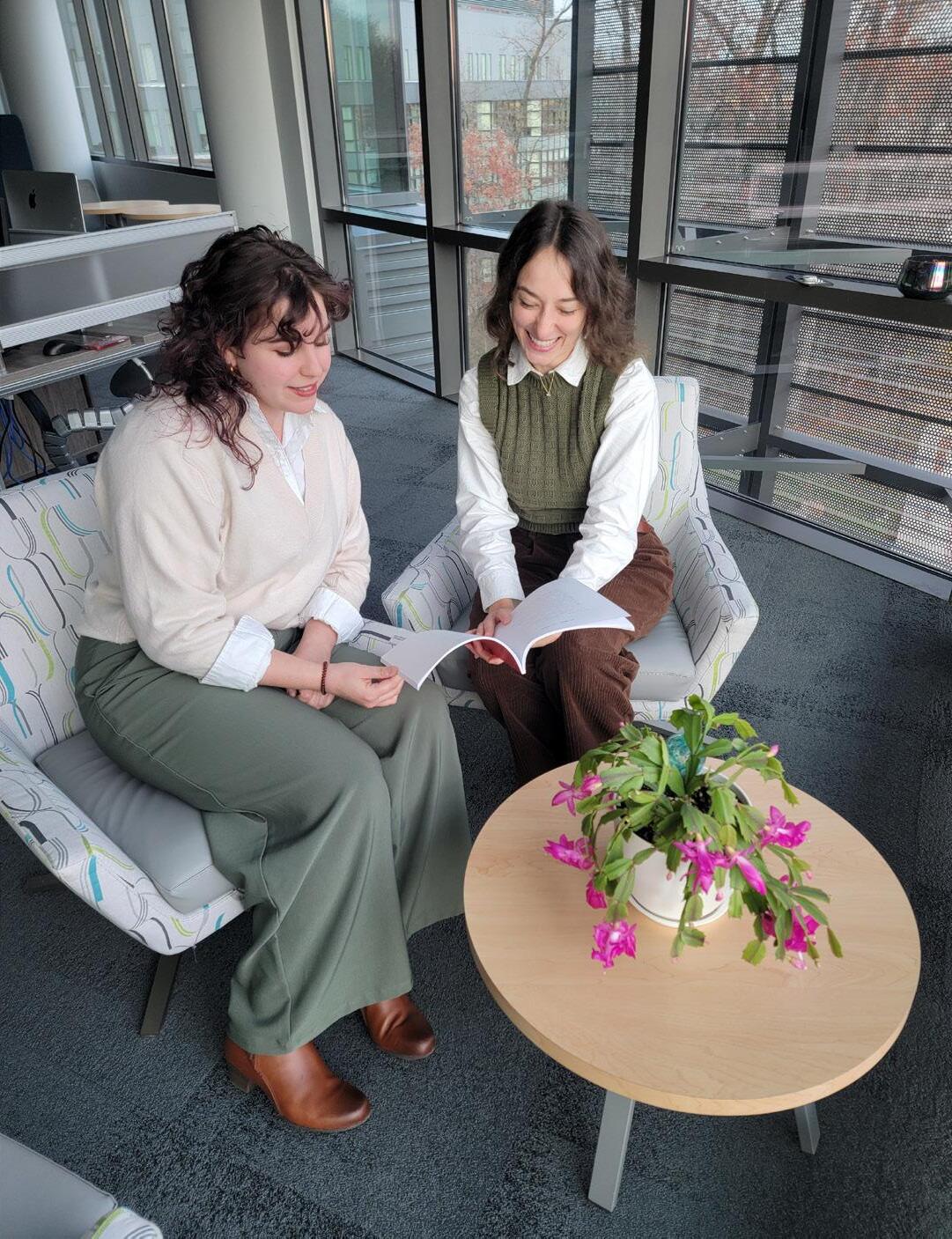
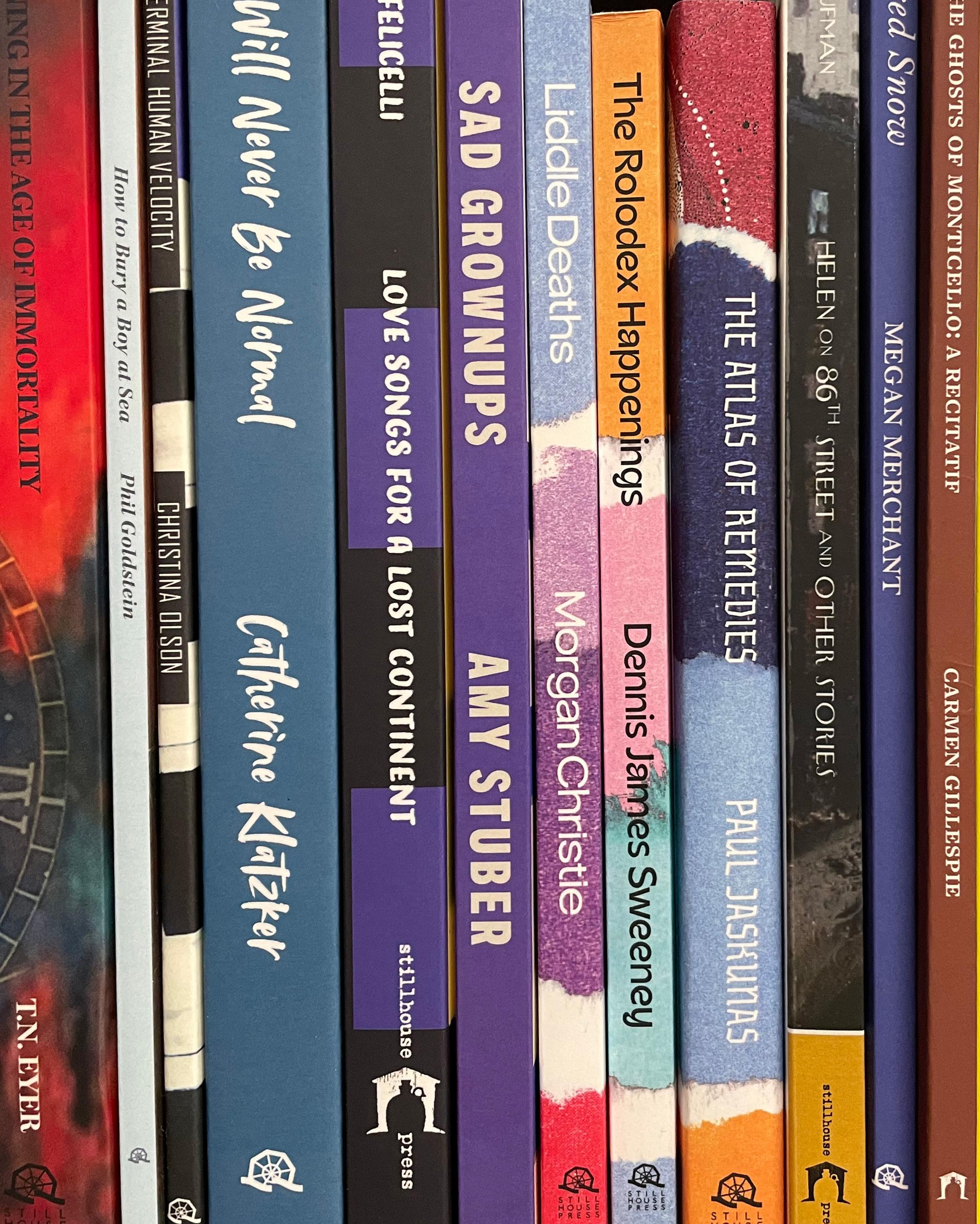
Shaefer, who is completing a three-year graduate professional assistantship with Stillhouse that includes a standard assistantship stipend and full tuition remission, believes that the certificate is a crucial step in her evolution as a publishing professional, providing her with an additional credential that nicely reflects all of the time and work she’s put in.
“I knew this was the experience I wanted–Stillhouse is the perfect place for me to learn about the publishing industry from the inside,” she says. “I think my favorite part of my work has been my experience as a publicist, where I get to give each project and author a level of individual attention they couldn’t receive if I were working for a big publisher and managing a dozen titles at once.”
“Taking the Stillhouse Press course as part of the certificate gives you the backbone to understand publishing concerns surrounding a book, from cover copy to a book’s idea reader,” adds Reynolds, who has also taught courses in composition, literature, and creative writing as a teaching assistant. “It’s inspiring to see what poets are submitting to the press and it helps grow my own manuscript as I polish it and work towards sending it out into the world.”


In addition to the Graduate Certificate in Publishing Practice, Mason’s English Department offers other certificates across a variety of fields—available as add-ons to students pursuing graduate degrees or as stand-alone programs of study.
The certificate in college teaching is designed for graduate students who are planning a career in undergraduate education. The program offers courses that enhance pedagogical skills and explore pedagogical assessment or scholarship with the use of technology in instruction. Two concentrations are available: in English Pedagogy and in Higher Education Pedagogy.
In just over two years, seventeen students have graduated with or enrolled in the certificate program, which is available as a stand-alone credential ideal for anyone looking to change to or advance a publishing career or an add-on to a Mason MA or MFA degree.
MA and certificate candidate Jennifer Miller, a graduate research assistant for the Mason Publishing Group and an intern at Stillhouse, emphasizes the well-rounded nature of her graduate education: “My time at Stillhouse Press has been extremely beneficial to my English MA as well as to the publishing certificate,” she says. “I was able to get a valuable behind-the-scenes look at the inner workings of a press and the publishing lifecycle of a book. The experience of working with a literary press is so valuable for anyone interested in books, the book industry, or a career in publishing.”
For more information on the Publishing Practice graduate certificate, visit the English Department website
The certificate in folklore studies enables students to explore the processes of tradition that move through multiple expressive forms, such as folktales, folk beliefs, folk medicine, folk art, folksong, and literature. A discipline based on ethnographic fieldwork, folklore studies offers students a chance to work in communities and collect living traditional materials that are critical to human identity and values. Interdisciplinary by nature, folklore thrives on local particularities as well as compelling global connections. This certificate prepares students for careers in cultural agencies, governmental organizations, and teaching institutions, and advanced study in folklore and in the humanities
There is a growing need for trained instructors of English as a second language. Using linguistics theory and research, this graduate certificate provides students with fundamental knowledge of English and the skills to teach it to non-native learners in the United States or abroad. Certificate courses fulfill, in part, requirements for an endorsement in English as a second language for the Virginia state teaching credential.
The Graduate Certificate in Literature and Composition prepares students for teaching literature and composition at the college level. Students learn about specific subject areas of American, British, and World literature and theories of composition, researching and analyzing literary works within their historical, formal, and theoretical contexts. Students learn how to use writing as part of an effective classroom practice. Upon completion of the certificate program, graduates are prepared to design literature and composition curriculum and assignments at the college level.
This certificate is centered on workplace uses of language. It offers students hands-on, practical and theoretical expertise in a wide range of issues and skills needed to develop a career in professional writing or to grow within their current careers. Graduates can be found throughout the DC area working independently, for the federal government, or for major corporations.
Inthe United States, a blood transfusion happens every 2 seconds. Access to blood and the quick distribution of it often facilitate crucial, lifesaving efforts made by clinicians nationwide. But what happens when a patient refuses such a procedure–and what happens when the reasons for that refusal are rooted in hesitancies and skepticisms about vaccines?
A team of researchers in the English Department has been exploring this new phenomenon of vaccinated blood refusal. Begun nearly two years ago, the project consists of teams in Mason’s Department of English—Professor Heidi Lawrence, author of Vaccine Rhetorics , graduate student Jessie Wiggins, and undergraduate student Katy Morejon Portillo—and at Virginia Tech: Julie Gerdes, Tèmítópé Òjédélé-Adéjùmò, and Hailey Richards. Altogether, this team has investigated this issue as it has emerged online, in clinical spaces, and through interviews with
patients and their doctors, in partnership with a major Midwest hospital system.
They began the project with an initial grant from 4VA to fund faculty and graduate student interviews and field work, and continued support from another 4VA grant has allowed them to take on additional undergraduate research assistants and work through further analysis. As the team has expanded to include multi-site collaboration and engagement with faculty, graduate student, and undergraduate research, the project has continued to develop and expand.
Below, Wiggins, Portillo, and Lawrence reflect on some of the most memorable parts of this project and the unique toolset English, medical rhetoric, and the humanities bring to this new problem in healthcare communication.
As wider audiences gain insight into these findings, the researchers also hope to demonstrate the value of English,

In May 2024, some members of the research team were able to observe various laboratory spaces and procedures during their field work visit to their clinic partners, including a “bloodless” surgery, which uses cell saver technology to reduce or eliminate the need for blood transfusions.
Pictured (l-r): Dr. Julie Gerdes, Tèmítópé Ọ̀jédélé-Adéjùmò, Jessie Wiggins, Heidi Y. Lawrence
medical rhetoric, and the humanities in real world problems impacting health and communication.
Jessie Wiggins’ Perspective
As a graduate student in the rhetoric of health and medicine, the opportunity to collaborate with researchers and clinicians has helped me bridge theoretical frameworks of rhetoric with real-world medical practice. From observing surgeries and witnessing the blood centrifuge machine in action to presenting on the rhetorics of blood at national conferences, I’ve found that this research project has not only deepened my understanding of medical rhetoric but also informed and enriched my dissertation.
Katy Morejon Portillo’s Perspective
Working on the blood transfusion and vaccine rhetoric project has opened my eyes to how people rationalize their beliefs and how fears can shape their views. It has also deepened my empathy for those who feel unheard, inspiring me to continue exploring complex topics and helping inform others. As an English major concentrating in writing and rhetoric, I never imagined I’d be interested in this field, but now I’m motivated to contribute to discussions around it.
Heidi Lawrence’s Perspective
As a longtime researcher in medical rhetoric and vaccine hesitancy, I was immediately fascinated by this project. So far, our qualitative work has been most illustrative to me. Our interviews with clinicians show experts desperately trying to meet patient demands and address their concerns, yet often beyond their expertise in how to communicate to a group they’d never encountered before. This project has taught me that vaccine hesitancy, once primarily the domain of pediatricians, is now poised to impact all kinds of specialties across medicine, including surgery and transfusion medicine, areas that never saw vaccine hesitancy before COVID.
It has also been an absolute joy to work with Jessie and Katy; their insights and different perspectives on medicine, online communication, and experiences of COVID have shaped the project in countless productive ways. Their contributions to the project have been absolutely crucial to its progress.
The team has already presented their emerging findings back to clinic partners and at three national conferences and has three articles currently in process. Lawrence and Wiggins were also recently featured on the Talking about Blood podcast, where they were interviewed about this issue.
People who use the same language never use it precisely the same way. Languages vary from region to region, community to community, even person to person, and English is no exception. It’s not just your pronunciation that differs depending on where you’re from and who you grew up around, either. People from different communities also use different sentence structures.
Would you say that your car needs washing, or that it needs washed? That you might be able to go, or that you might could go? That you don’t want anything right now or that you don’t want nothing?
In conversation, differences like these occasionally get in the way of understanding what someone means, but often they pass unnoticed. The fact that we often understand each other despite these differences tells us that language abilities are highly adaptable, and studying that adaptability can help reveal how language works in the mind and in society.
Assistant professor Cynthia Lukyanenko and Linguistics PhD student Brittany Lee-Bey are exploring how people who speak different varieties of English understand each other— starting right next door in Anacostia. To do so, they’re inviting community members who grew up in Southeast DC or neighboring regions of Prince George’s County to participate in a study that looks at how people understand sentences they would or would not say themselves. Data collection kicked off in December and is expected to continue through the spring and summer.
The study is part of a larger collaborative effort funded by the National Science Foundation. With additional locations in East Tennessee and at Penn State, the study will compare people’s eye-movements while they read sentences that are more common in their region or in one of the others. Researchers will look to see which sentences and patterns make participants more likely to pause or backtrack—indications that they’re having difficulty making sense of what they’re reading—and which ones don’t.
Will Washingtonians slow down when they read patterns that are more common in Appalachia? Will Penn Staters backtrack when they encounter sentences more common in Anacostia? Further studies will explore what people in all three locations expect speakers from their own or the other communities to say. Together, these studies will help us understand the kind of knowledge and abilities people who speak differently use understand each other anyway.
Interested in participating? Curious about student research opportunities? Email the lab at palm@gmu.edu.


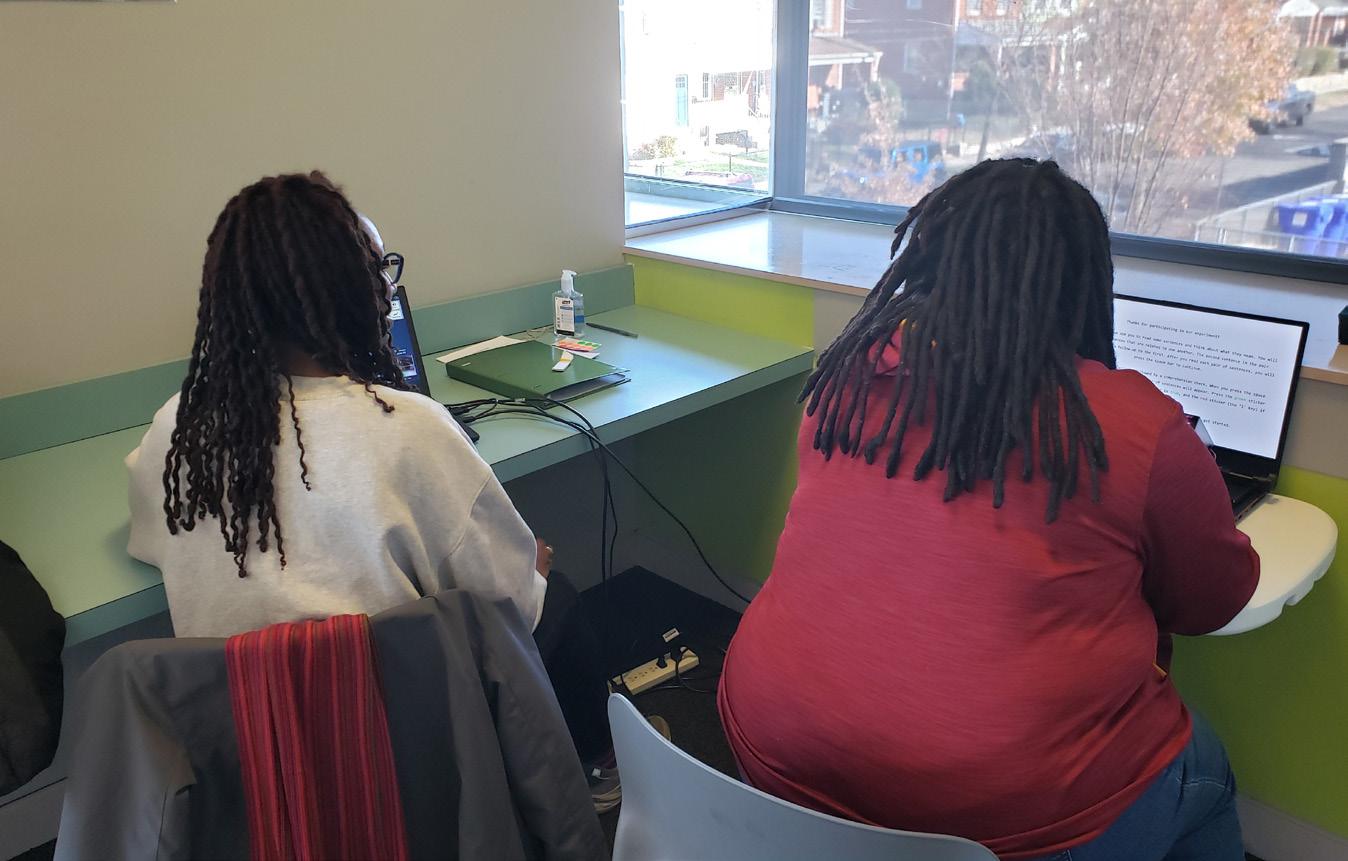
at The Speakeasy at Capo Deli in Washington, DC. Additionally, Patton has recently sold her first novel; The Summer Club will be published by William Morrow in 2026.

Jessica Anthony, MFA ’04, earned a spot on the National Book Award longlist for her recent novel, The Most, which was named one of Time Magazine’s 100 MustRead Books of 2024 and one of the Best Books of 2024 in The Washington Post, where it was described as “a smoldering, Cheeveresque mediation on mid-century, middle-class disappointment.”
Becky Bikowski/Bondurant, MFA ’09, drew on the storytelling skills she learned at Mason—and talked about her time in the MFA program—as part of the solo show Penis Envy, which made its world premiere at DC’s Capital Fringe Festival in Summer 2024.
Jessika Bouvier, an MFA student in fiction, published “I Think Chris McCandless Would’ve Called Me Fat in High School” in HAD magazine in September.
Brian Brodeur, MFA ’05, had a poem included in the 2025 Pushcart Prize anthology; “Primer” was originally published in The New Criterion
Lena Crown, MFA ’22, created a podcast, Awakeners, with Lit Hub Radio. Focused on mentorship in the literary arts, the podcast interviews writers, artists, critics and scholars who matter to one another, revisiting the early days of their collaboration to trace who and what has influenced their work. Among the guests in Season 1 are Mason professor Kyoko Mori and Abi Newhouse, MFA ’21.
Bareerah Ghani, MFA ’24, will participate in the panel “More than Just Conversation: On Literary Interviews & Why They Matter” at the 2025 AWP Conference in Los Angeles.
Joe Hall, MFA ’08, had several poems published recently: “Breath Gradients, Block by Block” online at the Cleveland Review of Books; “Fireballs 5: OSHA Tours the Application Factory” in the print edition of Cleveland Review

of Books; and “Directions to E’s Apartment on Fillmore,” “Directions to the Rite-Aid on Grant,” and “Directions to the Bus Shelter on Main” online at The Dialogist Hall published an essay, “PEN America: Cultural Imperialism’s Avant-Garde,” online in the Summer 2024 issue of Community Mausoleum, and he’ll be presenting the paper “To Become a Poet Is To Kill a Poet: Poetic Labor, Social Reproduction, & Revolution” in the session “It’s Free Because It’s Yours: Insurgent Poetics Against Late Capital’s Empire” at the Northeast Modern Language Association’s 2025 conference in March in Philadelphia, Pennsylvania. Finally, Hall will be promoted from Visiting Assistant Professor to Assistant Professor at St. Bonaventure University in Fall 2025.
Connor Harding, an MFA student in fiction, published “American Folklore” in HAD magazine in September.
Holly Mason Badra, MFA ’17, edited Sleeping in the Courtyard: An Anthology of Contemporary Kurdish Writers in Diaspora, featuring works by women and nonbinary authors, forthcoming from The University of Arkansas Press in June.
Nilima Mow, a third-year Ph.D. student in the linguistics program, presented the paper “Revitalizing Akuzipik Language and Mental Health: Creative Arts for Community Wellbeing” at the 12th Annual Indigenous Language Institute Symposium (ILI) in Albuquerque, New Mexico. Mow has two upcoming conference presentations in March: “Challenges and Insights: Surveying Language Attitudes in an Endangered Indigenous Language Community,” in collaboration with Mason professor Sylvia Schreiner, for the International Conference on Language Documentation & Conservation in Hawaii, and “Building Community Relationships in Indigenous Language Research: A Case Study from St. Lawrence Island, Alaska,” for the American Association of Applied Linguistics 2025 Conference in Denver, Colorado.
Brittany Kerfoot, MFA ’15, and Lina Patton, MFA ’16, have started a new storytelling series for women, trans-, and non-binary folks: Generation Women. Each show will center around a theme and feature six storytellers from six different generations, and the first show for Generation Women will be Wednesday, January 29 at 7pm
Elizabeth Deanna Morris Lake, MFA ’15, had two poems published in No Contact Mag: “When There’s Nothing Left to Do Except Everything Else” and “Monument.” She also published “All the Ways to Cut & Cook a Carrot” in Black Warrior Review’s Boyfriend Village, with illustrations by Ah-reum Han, MFA ’15.
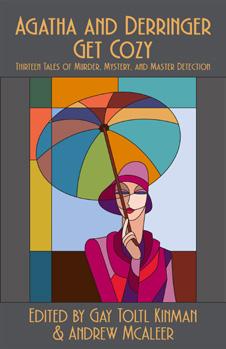
Tara Laskowski, MFA ’06, had two short stories published this fall: "The Ex-Files" in Agatha and Derringer Get Cozy: Thirteen Tales of Murder, Mystery, and Master Detection, and “After Their Convictions Six Murderers Reflect on How Killing Mr. Boddy Changed Their Lives,” co-written with Art Taylor, MFA ’06, in Black Cat Mystery Magazine
Chelsea Lebron, MFA ’24, and current MFA students Katey Funderburgh and Nick Ritter published an essay about the pedagogical strategies they use in the Juvenile Detention Center poetry workshop program, Poetry Alive! in Whale Road Review’s ”Teacher’s Lounge” section, which is dedicated to essays on the teaching of creative writing.
J.F. Merifield, MFA ’15, has a poetry collection, only half-breathed air, forthcoming in late 2025 from Finishing Line Press.
Tom Milani, BA ’82, MA ’86 with a concentration in creative writing, has a short story “Jesus Is on the Main Line” in the anthology Janie’s Got a Gun: Crime Fiction Inspired by the Songs of Aerosmith, published by White City Press in November.
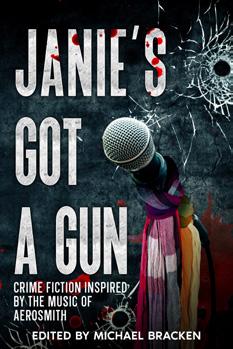
Angelina Morin, an MFA nonfiction student, had an essay, “My Friend Ofra,” published in GatherDC. The essay reflects on her search for community as a newcomer to Northern Virginia and her relationship with singer Ofra Haza.
Elisabeth Murawski, MFA ’91, has a new collection, Alias Irene, forthcoming in August from Fernwood Press, with additional poems ahead in Plume, Five Points, and The Greensboro Review.
Faith Palermo, an MFA student in nonfiction, had a story, “Annals of,” appear in Mulberry Literary.
Jihoon Park, MFA ’22, had his debut novel, Stickman, accepted by 7.13 Books for publication in 2026.
Martheaus Perkins, an MFA student in poetry, will have his debut poetry collection, The Grace of Black Mothers, published in July by Trio House Press.
Anna Stolley Persky, MFA ’24, was published in the Department of First Stories at Ellery Queen’s Mystery Magazine; “The Jews on Elm Street” appeared in the magazine’s September/October 2024 issue.
Whitney Poole, MFA ’12, has his second novel, The Black Clover Book, published in November by Liminal Books.
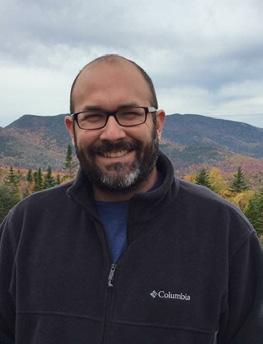
Darby Price, MFA ’14, has her debut book forthcoming from Black Lawrence Press; the lyric memoir All the Lands We Inherit will be published in June 2025.
Yelizaveta Renfro, MFA ’04, was a finalist for the Association of Writers and Writing Program’s James Alan McPherson Prize for the Novel for her manuscript “The Animatronic Geese of Michiana.”
Katie Richards, BA ’12, MFA ’21, was named George Mason University Employee of the Month in November 2024—accepting the honor in a ceremony with President Gregory Washington.
Richards, now in her 10th year of working at Mason, is the senior graduate program coordinator for the university’s Higher Education Program. In that position, she serves as an academic advisor for HEP master’s students from their applications through their graduation.
In a Mason article celebrating Richards’ honor, Kelly Schrum, a professor in the Higher Education Program, said, “Every day, we witness the positive energy, willingness
Victoria Jean Reynolds, an MFA student in poetry, had a poem, “Lullaby,” published in The West Trade Review
Sharon Ritchey, MFA ’05, writing as Sharon J. Wishnow, had her debut novel, The Pelican Tide, published in June by Lake Union Publishing
Lori Rottenberg, MA ’95 and MFA ’24, had several poems published over the last year: “Meals with Grandma and Grandpa” at the Viewless Wings Podcast, December 19, 2023; “Proof” and “Obituary” in the Spring/Summer 2024 issue of December; “Cleft” in the Spring 2024 issue of Pleiades; “You Drive Like a Man,” an Honorable Mention in the Passager Journal 2024 Contest Issue; and “DocumentAerie,” “The Ark, 1978,” and “Daiyenu” in the Mid-Atlantic Review’s section on Jewish excellence in October. Additionally, Rottenberg participated in an invitational reading with Day Eight/Mid-Atlantic Review at the MLK Library in Washington, DC.
Jenn Soehnlin, BA ’06, published On the Same Page with God: Embracing the Power of Paying Scripture in July with Autograph Publishing.

Eunice Tan, an MFA fiction student, had a creative nonfiction essay, “Ah-Gong Pancake,” in the Virginia Literary Review’s Fall 2024 issue Additionally, Tan was one of ten participants in a January novel workshop as part of the Winter Prose & Poetry Getaway, hosted near Atlantic City, New Jersey by Murphy Writing of Stockton University.
Taylor Franson Thiel, an MFA student in poetry, will have her debut poetry collection, Bone Valley Hymnal, published in May by ELJ Editions.
Emma Tull, BFA ’24, has a short story, “The Word of the Self,” appearing under her pen name, Kit Winterson, in the Spring 2025 issue of Short Vine Journal


to help, sincerity, and vast knowledge of university operations that Katie brings to her work. Katie is a model staff member and a proud Mason alum whose exemplary service to the College of Humanities and Social Sciences and George Mason University exemplifies the values honored through this award.”
November served as a milestone month for Richards in another way—with the publication of her first book of poetry, Apple
Chrissy Widmayer, MFA ’13 with a folklore certificate, is the director of Community Powered, a program through the Wisconsin Humanities that helps participating communities to “experience new ways to unearth and tell stories of their communities while taking concrete steps toward making their hometowns better places to live.” Community Powered recently won the Schwartz Prize for Outstanding Public Humanities Programming from the Federation of State Humanities Councils.
Mind, from Harbor Editions. The collection was selected as an editors’ pick for the Laureate Prize with Harbor Editions and was also a semi-finalist for the 2021 Philip Levine Prize for Poetry.
Jennifer Atkinson, Richards’ former professor in the MFA program, called the collection “startling—not just in its ostensible subject—parenting neurodivergent children— but also in its clarity and candor, its toughness and lyrical tenderness, its formal dexterity, and the breadth of its emotional range. These passionate, compassionate, intimate, and even informative poems leave me breathless.”
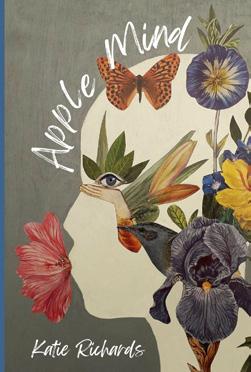
For more information on Richards and her work, visit her website at https://katie-richards.com/.
Fall for the Book continues its yearround programming this spring with the third annual Mini Fest on Thursday, February 2, in Fenwick Library. Featured speakers include Steve Almond, author of Truth Is the Arrow, Mercy Is the Bow: A DIY Manual for the Construction of Stories, and Matthew Gabriele, author of Oathbreakers: The War of Brothers That Shattered an Empire and Made Medieval Europe
On Thursday, March 27, Adam Nimoy comes to the Sherwood Center in Fairfax to discuss his memoir The Most Human: Reconciling with My Father, Leonard Nimoy. Then the festival goes virtual with two April programs in partnership with the Osher
Lifelong Learning Institute: Wendy Chen, author of Their Divine Fires, and A. Ashley Hoff, author of With Love, Mommie Dearest: The Making of an Unintentional Camp Classic.
Also this spring, Fall for the Book’s podcast presents the season of the memoir and personal essay, featuring Greg Wrenn, Jennifer Brice, Jen Soriano, Sally Chaffin Brooks, and Bernardine Watson.
Listen to Fall for the Book’s Podcast on Spotify. Don’t forget to check out their YouTube channel for bonus content. For more information, visit FallfortheBook.org or follow them at @fallforthebook.bsky.social.
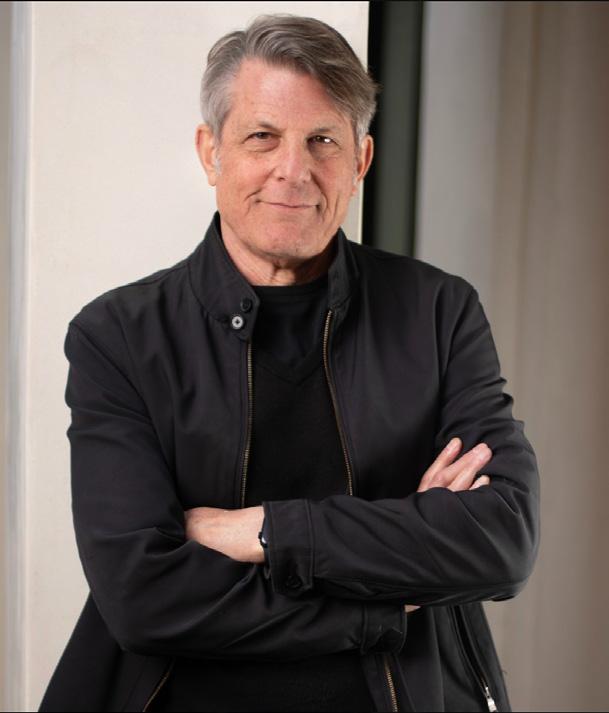
Adam Nimoy, author of The Most Human: Reconciling with My Father, Leonard Nimoy
George Mason University’s Creative Writing Program joins Watershed Lit and Mason’s University Libraries in presenting the Spring 2025 Visiting Writers Series. Readings take place at 7:30 p.m. in Fenwick Library, either in the Main Reading Room or in Instructional Rooms 1014 A&B. Book sales are supported by Scrawl Books of Reston, Virginia.
Visit creativewriting.gmu.edu for updated information ahead.
Thursday, February 6, 7:30 p.m.
Fenwick Library Main Reading Room, Room 2001
Catherine Barnett is the author of four poetry collections, including Solutions for the Problem of Bodies in Space (2024 Graywolf); Human Hours (Believer Book Award, New York Times «Best Poetry of 2018» selection); The Game of Boxes (James Laughlin Award); and Into Perfect Spheres Such Holes Are Pierced (Beatrice Hawley Award).
Thursday, April 3, 7:30 p.m.
Fenwick Library Instructional Rooms 1014 A&B
Mary-Alice Daniel’s poetry debut, Mass for Shut-Ins (2023), won the 117th Yale Younger Poets Prize and a California Book Award. In 2022, Ecco/HarperCollins published her tricontinental memoir, A Coastline Is an Immeasurable Thing, which was People’s Book of the Week and one of Kirkus Reviews’ Best Nonfiction Books of the Year.

MAKO YOSHIKAWA (NONFICTION)
Thursday, April 10, 7:30 p.m.
Fenwick Library Instructional Rooms 1014 A&B
Mako Yoshikawa’s first novel, One Hundred and One Ways, was a national bestseller, and was translated into six languages. Her second novel, Once Removed, has also been translated. Secrets of the Sun, her first memoir, published in 2024 and was called “incandescent…gorgeous” by Booklist and “deeply felt, eloquent” by Michiko Kakutani.
SAM ASHWORTH (FICTION)
Thursday, April 24, 7:30 p.m.
Fenwick Library Main Reading Room, Room 2001
Samuel Ashworth is the author of The Death and Life of August Sweeney. He holds an MFA from George Mason University and was the recipient of a Cheuse Center Fellowship to support research for his debut novel.
